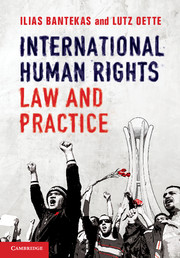Book contents
- Frontmatter
- Contents
- List of abbreviations
- Table of Cases
- Introduction
- 1 International human rights law and notions of human rights: foundations, achievements and challenges
- 2 International human rights law: the normative framework
- 3 Human rights in practice
- 4 The United Nations Charter system
- 5 The UN human rights treaty system
- 6 Regional human rights treaty systems
- 7 Individual complaints procedures
- 8 Civil and political rights
- 9 Economic, social and cultural rights
- 10 Group rights: self-determination, minorities and indigenous peoples
- 11 The human rights of women
- 12 The right to development, poverty and related rights
- 13 Victims’ rights and reparation
- 14 The application of human rights in armed conflict and the international criminalisation process
- 15 Human rights and counter-terrorism
- 16 Non-state actors and human rights
- 17 Globalisation and its impact on human rights
- Index
- References
13 - Victims’ rights and reparation
- Frontmatter
- Contents
- List of abbreviations
- Table of Cases
- Introduction
- 1 International human rights law and notions of human rights: foundations, achievements and challenges
- 2 International human rights law: the normative framework
- 3 Human rights in practice
- 4 The United Nations Charter system
- 5 The UN human rights treaty system
- 6 Regional human rights treaty systems
- 7 Individual complaints procedures
- 8 Civil and political rights
- 9 Economic, social and cultural rights
- 10 Group rights: self-determination, minorities and indigenous peoples
- 11 The human rights of women
- 12 The right to development, poverty and related rights
- 13 Victims’ rights and reparation
- 14 The application of human rights in armed conflict and the international criminalisation process
- 15 Human rights and counter-terrorism
- 16 Non-state actors and human rights
- 17 Globalisation and its impact on human rights
- Index
- References
Summary
Introduction
International human rights law has for a long time focused primarily on standard-setting and the establishment of institutions tasked with promoting human rights and monitoring states’ compliance with their obligations. Limited attention was paid to victims as rights-holders and to the availability of effective remedies for the vindication of rights. Yet, slowly, conceptual shifts and practices, beginning at the national level, changed prevailing perceptions of victims as largely passive beneficiaries, resulting in growing calls for victims to play a more active role, particularly in the criminal justice process. The exclusion of victims and their lack of opportunity to participate effectively in proceedings that affect their rights were increasingly seen as an anomaly, raising the fundamental question of whose interests a justice system is supposed to serve. This is reflected in the work of scholars and practitioners in the field of victimology and renewed interest in restorative justice.
This change in thinking gained international currency initially with the 1984 UNGA Declaration of Basic Principles of Justice for Victims of Crime and Abuse of Power (hereinafter Victims’ Declaration) and more than twenty years later culminated in the Basic Principles and Guidelines on the Right to a Remedy and Reparation for Victims of Gross Violations of International Human Rights Law and Serious Violations of International Humanitarian Law (hereinafter Basic Principles). The impetus for victims’ rights owes a lot to the increasing availability of regional and international complaints procedures. The growing recourse to these procedures has enabled, if not compelled, regional and international human rights treaty bodies to develop their jurisprudence and, to varying degrees, strengthen victims’ rights in the process. More recently, the establishment of international(ised) criminal tribunals, in particular the ICC, has led to a keener appreciation of victims’ rights, including the right to protection and the right to participation.
- Type
- Chapter
- Information
- International Human Rights Law and Practice , pp. 522 - 566Publisher: Cambridge University PressPrint publication year: 2013

